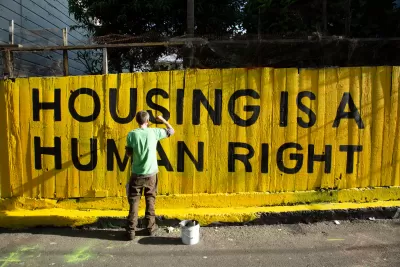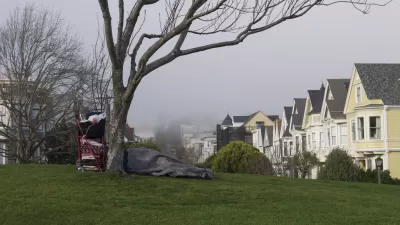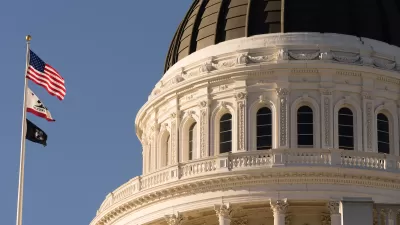Gov. Gavin Newsom proposed in March a two-part ballot initiative to tackle homelessness, focusing on mental illness and substance abuse, which would provide 10,000 beds in new, voluntary treatment facilities—but one funding source is controversial.

Governor Gavin Newsom makes no excuses on California's homeless problem. “We own this,” he told Fox News host Sean Hannity on June 12 in a wide-ranging interview.
Homelessness is difficult enough to deal with. Add mental illness and substance abuse and the problem appears intractable. On March 19, Newsom teamed up with Senator Susan Talamantes Eggman (D-Stockton), “a former social worker and college professor who chairs the Senate Health Committee and is widely acknowledged as the state’s legislative leader on mental health legislation,” according to Capitol Weekly, to propose “the next step to modernize how California treats mental illness, substance use disorders, and homelessness,” a two part ballot initiative aimed for the March 5, 2024 ballot based on:
- A general obligation bond to build “thousands of new community behavioral health beds in state-of-the-art residential settings to house Californians with mental illness and substance use disorders, which could serve over 10,000 people every year.”
- “Amend the Mental Health Services Act (MHSA), leading to at least $1 billion every year in local assistance for housing and residential services for people experiencing mental illness and substance use disorders, and allowing MHSA funds to serve people with substance use disorders.”
Kristen Hwang, a health care reporter for the non-profit CalMatters, reported on June 20 on the controversy with amending the ongoing funding source. “The announcement was met with praise from legislative leaders and alarm by children’s mental health advocates who fear cuts to their services,” she wrote.
About one-third of the county mental health infrastructure in the state is supported by the Mental Health Services Act, which was approved by voters in 2004 as a ballot initiative [Proposition 63] that levied a 1% tax on the state’s millionaires. Substantial changes to the act, like the ones proposed, are subject to further voter approval. Last year the tax generated about $3.8 billion.
“They don’t seem to have done any analysis on what they’re giving up to have this $1 billion for housing,” said Lishaun Francis, senior director of behavioral health at Children Now. “It’s an interesting time to make a change that seemingly shifts resources away from young people.”
Legislative analysis
Sen. Eggman's bill, SB-326: The Behavioral Health Services Act, would amend the income tax funding source. On July 13, the state's Legislative Analyst's Office provided that analysis that showed a loss of “nearly $720 million away from services provided by county governments annually,” reported Hwang on July 17 in the source article.
Although that money would be reallocated within the system, in part to house homeless individuals with severe mental illness and addiction disorders, the report authors note that Newsom and key legislators supporting the proposal have neither provided a complete justification for the changes nor have they published an analysis on how the changes may “negatively impact current services.”
SB 326 passed the state Senate, 39-0, on May 24, and was being reviewed by the Assembly Health Committee in mid-July.
Bond measure
Assembly Bill 531, The Behavioral Health Infrastructure Bond Act of 2023, “would authorize the issuance of bonds in the amount of $4,680,000,000 to finance grants for the acquisition of capital assets for, and the construction and rehabilitation of, unlocked, voluntary, and community-based treatment settings and residential care settings and also for housing for veterans and others who are experiencing homelessness or are at risk of homelessness and are living with a behavioral health challenge.”
It passed the Assembly 80-0 on May 24 and was in the Senate Appropriations Committee in mid-July.
Related past ballot measure
The proposal is similar to Proposition 2: Use Millionaire's Tax Revenue for Homelessness Prevention Housing Bonds Measure, approved by over 63% of voters in November 2018.
- Planetizen: $2 Billion Bond Measure on California Ballot to House the Mentally Ill Homeless, July 2, 2018
However, that was one-time use of the Prop. 63 funding source for revenue bonds. SB 326 would provide an ongoing revenue stream from the millionaire surtax. Similar to the current initiative proposal, it was paired with a general obligation bond housing measure, Proposition 1, that was also approved by voters.
Election 2024: California
If AB 531 and SB 326 pass the legislature, as they appear they are on track to do, and signed by Newsom, they will appear on the March 5, 2024 presidential primary ballot as legislatively referred state statutes. According to Ballotpedia's California 2024 ballot propositions webpage, the only measure to qualify as of July 30 is the California Remove Voter Approval Requirement for Public Low-Rent Housing Projects Amendment, a legislatively referred constitutional amendment.
Additional reading from the governor's office:
- Governor Newsom & Legislative Partners Unveil Transformation of California’s Mental Health Services Act, June 20, 2023
- Behavioral Health Reform Leaders Meet as Momentum Builds for Governor Newsom’s Historic Proposal to Fund 10,000 Community Beds & Housing Units, July 12, 2023
- Six-page fact sheet: Governor Newsom’s Transformation Of Behavioral Health Services [pdf], June 2023
FULL STORY: Gavin Newsom’s mental health plan could strip more than $700 million from services, report says

Trump Administration Could Effectively End Housing Voucher Program
Federal officials are eyeing major cuts to the Section 8 program that helps millions of low-income households pay rent.

Planetizen Federal Action Tracker
A weekly monitor of how Trump’s orders and actions are impacting planners and planning in America.

Ken Jennings Launches Transit Web Series
The Jeopardy champ wants you to ride public transit.

Washington Legislature Passes Rent Increase Cap
A bill that caps rent increases at 7 percent plus inflation is headed to the governor’s desk.

From Planning to Action: How LA County Is Rethinking Climate Resilience
Chief Sustainability Officer Rita Kampalath outlines the County’s shift from planning to implementation in its climate resilience efforts, emphasizing cross-departmental coordination, updated recovery strategies, and the need for flexible funding.

New Mexico Aging Department Commits to Helping Seniors Age ‘In Place’ and ‘Autonomously’ in New Draft Plan
As New Mexico’s population of seniors continues to grow, the state’s aging department is proposing expanded initiatives to help seniors maintain their autonomy while also supporting family caregivers.
Urban Design for Planners 1: Software Tools
This six-course series explores essential urban design concepts using open source software and equips planners with the tools they need to participate fully in the urban design process.
Planning for Universal Design
Learn the tools for implementing Universal Design in planning regulations.
Heyer Gruel & Associates PA
Ada County Highway District
Institute for Housing and Urban Development Studies (IHS)
City of Grandview
Harvard GSD Executive Education
Toledo-Lucas County Plan Commissions
Salt Lake City
NYU Wagner Graduate School of Public Service





























